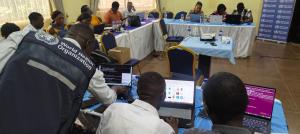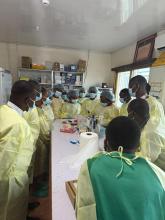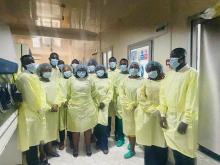From genome to action: Building Sierra Leone’s next generation of genomic leaders for public health resilience beyond mpox
Freetown, Sierra Leone, August 19, 2025 – Sierra Leone has taken an important step in strengthening its public health system by hosting a two-week national workshop on DNA sequencing and bioinformatics from August 4 to August 15, 2025 in Freetown. The training, held under the theme “From Genome to Action: Enhancing Mpox Surveillance through Sequencing and Bioinformatics in Sierra Leone,” was supported by the World Health Organization (WHO). It focused on building the country’s capacity to track and understand diseases through genomic science, with mpox as a key focus, but also extending to other infectious diseases.
The training served as a mentorship program for 16 young scientists, 15 of whom had already received foundational genomics training with WHO support. This advanced phase transitioned them to mid-level genomic experts capable of sophisticated data analysis and interpretation to inform real-time public health interventions. The sessions were practical and hands-on, covering:
DNA sequencing: learning how to read and understand genetic material using Illumina platforms.
Bioinformatics analysis: interpreting genetic information to see how diseases spread and change.
Data stewardship: submitting results to international databases to support global knowledge.
Outbreak analytic: turning genetic information into actions that help control outbreaks.
The comprehensive program went beyond mpox, also covering diseases like Ebola, COVID-19, Lassa fever, HIV, and antimicrobial resistance. It also introduced broader tools that allow scientists to study different types of pathogens at once. Already, the Central Public Health Reference Laboratory (CPHRL) is applying these skills in HIV-2 research. “This is mentorship in motion. We’re growing future genomic leaders from within,” said Doris Harding, Laboratory Lead at the National Public Health Agency (NPHA).
As of August 18, 2025, Sierra Leone had sequenced 10.1% (522 out of 5,154) of its confirmed mpox cases, meeting both national and continental targets of 8–10%. This progress shows how far the country has come, but also highlights the need to maintain momentum. By training participants from start to finish - sample collection to reporting, the workshop not only boosted mpox surveillance but also set the stage for sustainable genomic monitoring systems. “This is sustainability in action – building resilient systems by empowering the laboratory pillar,” emphasized Dr. Ameh George, WHO Representative to Sierra Leone.
Participants shared how the training had impacted them: “We are deeply grateful for this investment in capacity building. The opportunity has not only enriched our professional knowledge but has also given us confidence to contribute meaningfully to research and health systems,” said Abu Bakarr Sawaneh from Connaught lab. Vidalyn Folorunso, a Medical Laboratory Scientific Officer from CPHRL added, “Let us keep practicing, applying the knowledge gained, and making good use of it in our institutions.”
Allan Campbell, CPHRL Lead & DNA Sequencing Training Lead, highlighted the lasting benefits: “This mentorship-driven model not only meets today’s needs but also builds a pipeline of future genomic experts. By empowering local scientists with the ability to lead using data and speed, Sierra Leone is strengthening its role in regional and global health security—whether in Mpox, HIV, cancer, antimicrobial resistance, or Ebola.”
Walter Oguta, WHO AFRO EPI Analytics Specialist & Bioinformatics Training Lead, underscored the bigger picture: “The workshop was a pivotal step in embedding genomic science into Sierra Leone’s health system. By training a new generation of scientists, the country is now better positioned to respond to outbreaks with data-driven precision.”
The August 2025 workshop stands as a milestone in Sierra Leone’s public health journey. By combining mentorship, advanced training, and a focus on sustainability, it has built a new generation of scientists ready to lead the country’s response to present and future health threats. This effort marks the beginning of a stronger, data-driven foundation for health security in Sierra Leone.


